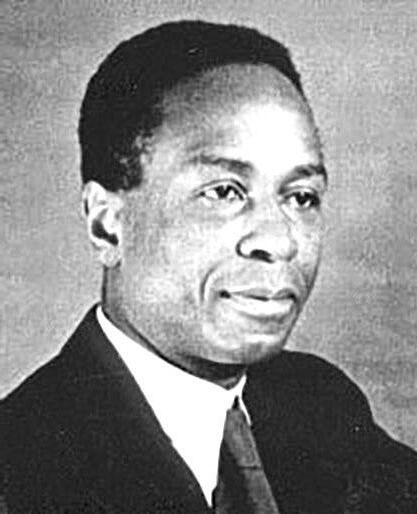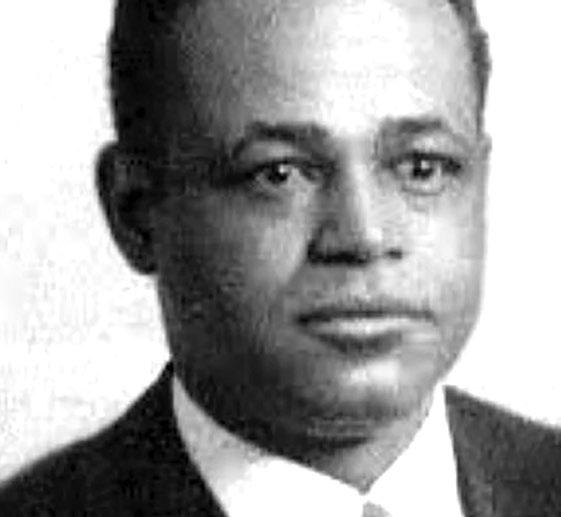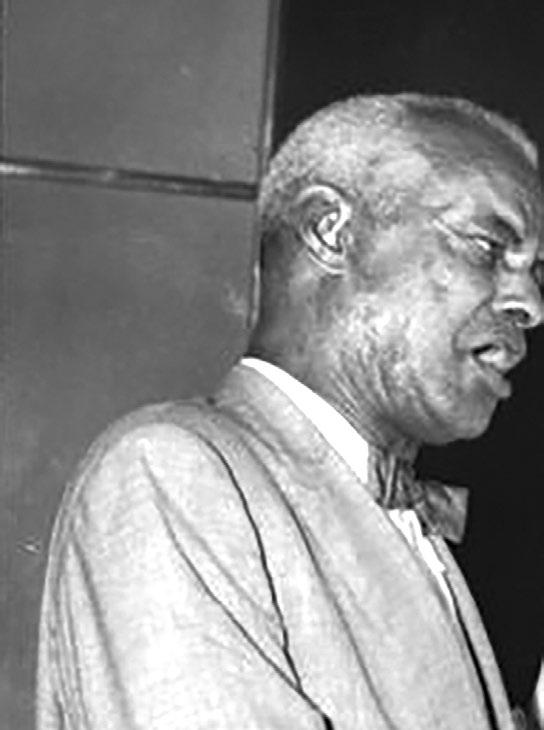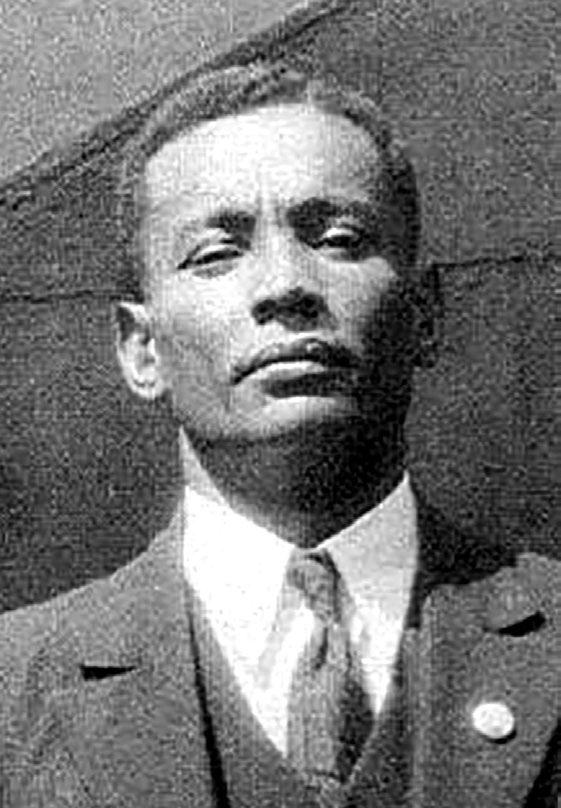
6 minute read
Four Black Caribbean Immigrants In US Black History
As we begin another Black History Month in the United States, we at Caribbean Today also celebrate the many Black Caribbean immigrants who were an undeniable part of US Black History. Here are four you should know.
GEORGE PADMORE
Advertisement
link its organizing in the U.S. Padmore died on September 23, 1959, aged 56, at University College Hospital in London.
Otto Huiswood
Otto Eduard Gerardus
Majella Huiswoud was a Surinamese political activist who was a charter member of the Communist Party of America. Huiswoud is regarded as the first black member of the American communist movement. Huiswoud served briefly as the Communist Party’s representative to the Executive Committee of the Communist International in 1922 and was a leading black Comintern functionary during the decade of the 1920s.
Huiswoud was born October 28, 1893, in Paramaribo, in what was then the Dutch colony of Surinam and is today the capital of member of the Socialist Party of America (SPA), participating actively in the Young People’s Socialist League at Cornell University in Ithaca, New York, where he studied agriculture.
During the summer of 1918, Huiswoud took a job working on a pleasure boat that was part of the Fall River Line. Black crew members were not organized by the International Seamen’s Union, so Huiswoud took it upon himself to lead a walkout that led the company to negotiate for better pay and improved working conditions for its minority workers.
Huiswoud found himself a supporter of the Left Wing Section of the Socialist Party during the acrimonious factional war of 1919. He was one of 94 delegates to the June 1919 National Conference of the Left Wing, which elected a governing Left Wing National Council and participated in the formation of the Communist Party of America on September 1 of that year.
George Padmore was one of the Caribbean immigrant founding member of The African Blood Brotherhood for African Liberation and Redemption organization. A journalist, radical activist, and theoretician, Padmore did more than perhaps any other single individual to shape the theory and discourse of Pan-African anti-imperialism in the first half of the twentieth century.
He was born Malcolm Ivan Meredith Nurse in Trinidad. Nurse attended Tranquillity School in Port of Spain, before going to St Mary’s College for two years. He transferred to the Pamphylian High School, graduating from there in 1918. After that he worked for several years as a reporter with the Trinidad Publishing Company.
In late 1924, he travelled to the United States to take up medical studies at Fisk University, a historically black college in Tennessee and then Howard University. In 1928 he dropped out of Howard’s law school and joined the American Communist Party and adopted the name George Padmore.
Padmore officially joined the Communist Party in 1927 (when he was in Washington, DC) and was active in its mass organization targeted to black Americans. In March 1929 he was a fraternal (non-voting) delegate to the 6th National Convention of the CPUSA, held in New York City.

Padmore, through the African Blood Brotherhood for African Liberation and Redemption, raised made note of black people’s exploitation as a class and as a race, which led to his criticism of the C P’s failure to the independent country of Suriname. He was the son of Rudolf Huiswoud, a former slave who had gained his freedom as a boy of 11 and who learned the skills of a tailor, working at the trade until his death in 1920. His mother, Jacqueline Bernard Huiswoud, originally hailed from the island of Curaçao. Otto was the fifth child and the second son in a family of eight siblings.

Huiswoud was unhappy with his lot in life as a printer’s apprentice, however, so in January 1910 the 16-year-old convinced his father to allow him to depart to see the world and he shipped out on a banana boat bound for the Netherlands.
Due to the abysmal working conditions onboard, Huiswoud and two of his Surinamese mates decided to jump ship when it was docked in New York. He settled in Brooklyn, where he made ends meet by working at various jobs as a printer, cook, and janitor.
In New York, Huiswoud was exposed to soapbox speakers in Union Square, where he was introduced to socialist arguments and literature for the first time.
By 1916, he had become a
Through his connection to the radical black political leaders of Harlem, Huiswoud eventually made his way to membership in the African Blood Brotherhood, a secret society established by Cyril Briggs to promote black liberation and self-defense against the Red Summer of 1919. Although an active participant in the organization, Huiswoud was not among the group’s founders.
In the summer of 1922, Huiswoud was chosen as the candidate of the Workers Party of America - the new “legal” political arm of what was then the underground Communist Party – as its candidate for the New York State Legislature in its 22nd Assembly District.
RICHARD B. MOORE
Richard Benjamin Moore was a Barbados-born AfroCaribbean civil rights activist, writer and prominent socialist. Moore migrated to the United States and arrived in New York City on July, 4, 1909. However, Moore would not become a naturalized citizen until September 11, 1924.

Although African Americans were free in the United States, they were far from being treated equal to European-Americans. Moore was immediately faced with ethnic discrimination when it came to employment and educational opportunities. Although trained in Barbados to do clerical work, he was forced to turn to other jobs such as an elevator operator and work in a silk manufacturing firm.
The struggles that Moore he worked as a Pullman car porter on the New York Central Railroad.
In 1924 Totten was elected to represent New York porters at a wage conference in Chicago. As a result of the conference, the porters gained a meager wage increase. Disappointed by the outcome, Totten approached black labor activist Asa Philip Randolph for help the following year. After a few meetings, Randolph agreed to lead the new union, the Brotherhood of Sleeping Car Porters.
Totten was soon fired from Pullman and devoted all his time to organizing the Brotherhood. Though encountered and observed made him become a strong advocate for the rights of African Americans. In 1919, he joined the African Blood Brotherhood (ABB), which was an organization formed to defend African Americans from race riots and lynching. Moore, along with other African American advocates, joined the Socialist Party in the early 1920s. Moore also joined the Socialist Party, partly because the Socialist Party was then transforming itself into a force to fight against segregation.
Moore was a frequent political candidate of the Communist Party. In 1928 he ran for the US Congress in New York’s 21st congressional district In 1934, Moore ran on the Socialist ticket for Chief Judge of the New York Court of Appeals. In 1935, he became the organizer for the International Labor Defense in the New England Territory. He also played a leading role in Caribbean advocacy groups. Moore also ran the Frederick Douglass Book Center in Harlem. He wrote a few books himself, including The Name “Negro”: Its Origin and Evil Use (1960) and Caribs, Cannibals and Human Relations (1972). He also had essays and articles published in various magazines and journals, including the Negro Champion, Daily Worker, and Freedomways. Moore died in his homeland of Barbados in 1978, at the age of 85.
ASHLEY TOTTEN
Ashley Totten, a Pullman New York porter, made the bold move of organizing a porters’ labor union in 1925 - the Pullman Porter Athletic Association.
Totten was born on St. Croix in the US Virgin Islands in 1884 and moved to New York in 1905 according to Yellowpigs.com. After serving in the U.S. Navy, he returned to New York in 1915, where
Randolph is remembered as the primary figure of the union, Totten’s work was perhaps equally instrumental.
In addition to working for the Brotherhood to improve conditions in the United States, Totten was involved in Virgin Islands politics during the unpopular naval rule. With fellow Virgin Islander Elizabeth Hendrickson, he founded and administered the Virgin Islands Protective League, an organization which aimed at addressing the racial mistreatment of those in their homeland. In 1918 Totten and Hendrickson were selected as delegates to travel to the Virgin Islands to gain firsthand knowledge of the post-transfer conditions.
Totten also served as the president of the American Virgin Islands Civic Association, was appointed by Harry S Truman to the Board of Directors of the Virgin Islands Corporation, was a chairman of the draft board in Harlem, and served as vice president of the Trade Union Division of the Liberal Party of New York City. - NewsAmericasNow.com










